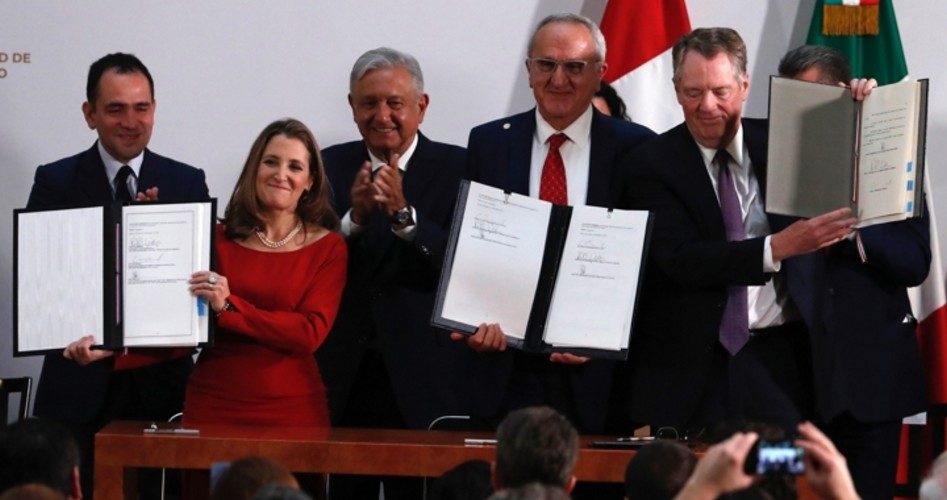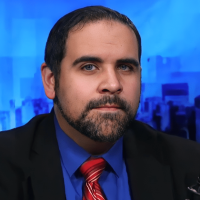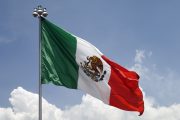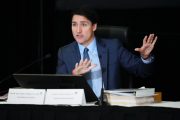
• United States Trade Representative Robert Lighthizer, Mexican Deputy Foreign Minister Jesús Seade, and Canadian Deputy Prime Minister Chrystia Freeland sign amendments to USMCA
• Mexican senator says judges on USMCA bi-national panels will have “regional jurisdiction”
• Freeland calls USMCA a “progressive trade agreement” again
• Freeland snubs Trump in remarks at new signing ceremony
• Ways and Means Chairman Richard Neal says USMCA is “an agreement shaped by Democrats”
• Neal and Lighthizer agree that amended USMCA is template for future trade agreements
• GOP Senator Pat Toomey says USMCA has “moved way to the left”
On Tuesday, in Mexico City, U.S. Trade Representative Robert Lighthizer, Mexican Deputy Foreign Minister Jesús Seade Kuri, and Canadian Deputy Prime Minister Chrystia Freeland signed the Protocol of Amendments to the Agreement Between the United States of America, the United Mexican States, and Canada. This 27-page document are all of the changes to the USMCA that Democrats spent months negotiating with Lighthizer and the Trump Administration in order to garner their support for approving the USMCA in the Democrat-controlled U.S. House of Representatives. The Protocol of Amendments was signed in Mexico City just as Speaker Nancy Pelosi and House Democrats held a press conference on Capitol Hill announcing and praising the new changes to the agreement.
Senator Ricardo Monreal Ávila of Mexico’s socialist National Regeneration Movement, known by its Spanish acronym MORENA, announced, “On behalf of the Senate of the Republic — the body empowered by the constitution for the ratification of accords, treaties, and international conventions — we celebrate that Mexico [and the] United States have made an agreement that allows us to move towards the approval and ratification of [the] trade Treaty between Mexico, United States, and Canada in the two remaining countries.”
Senator Monreal didn’t waste any time in touting the supranational nature of the USMCA. “It will now be easier to establish panels of regional jurisdiction, or with regional jurisdiction, composed of judges from both countries that address all types of differences that may arise on any subject covered by the treaty,” Monreal proclaimed.
The “regional jurisdiction” Monreal described would operate outside the established judicial systems or courts of Mexico, the United States, and Canada and not be subject to them — thus potentially subordinating U.S. citizens and companies to these panels in the event of a dispute — much like NAFTA’s international dispute settlement mechanisms or “NAFTA courts.”
Of the newly updated USMCA, Canadian Deputy Prime Minister Chrystia Freeland said, “When this agreement is enacted, NAFTA will not only be preserved, it will be updated, improved, and modernized for the 21st century.”
Freeland’s comments about how the USMCA preserves NAFTA and modernizes it came just hours after President Trump tweeted:
America’s great USMCA Trade Bill is looking good. It will be the best and most important trade deal ever made by the USA. Good for everybody – Farmers, Manufacturers, Energy, Unions – tremendous support. Importantly, we will finally end our Country’s worst Trade Deal, NAFTA!
— Donald J. Trump (@realDonaldTrump) December 10, 2019
Freeland’s remarks are also contrary to those delivered by President Trump at the White House Rose Garden, celebrating the completion of the initial text of the USMCA on October 1, 2018. “It’s a much different deal. It’s a brand-new deal. It’s not NAFTA redone,” Trump then jubilantly declared.
Freeland again touted, “This is a progressive trade agreement that will be profoundly beneficial for our economy, for Canadian families, and for the middle class.” (Emphasis added.) Freeland elaborated, “Today, Canada, the United States, and Mexico have agreed to improvements to the new NAFTA that strengthen state-to-state dispute settlement, labor protection, environmental protection, intellectual property, the automotive rules of origin, and will help keep the most advanced medicine affordable for Canadians.”
On the subject of integration, Freeland added, “These amendments will ensure that rules-based trade between our three countries will continue to support the economic prosperity of all of our people and the global competitiveness of North America as a region.” (Emphasis added.) In other words, the USMCA is not intended to strengthen the individual competitiveness of Canada, the United States, and Mexico as independent sovereign nations, but as an amalgamated “region,” similar to the European Union’s Eurozone or common market.
Freeland also snubbed President Trump twice in her remarks, when she said, “Our three countries have worked very hard together to modernize NAFTA and to maintain key provisions that provide stability, predictability, and rules-based trade for North American consumers and businesses and we have accomplished this together at a moment when around the world it is increasingly difficult to get trade deals done.” (Emphasis added.)
“I would like to thank President López Obrador, Under Secretary Jesus Seade, Speaker Nancy Pelosi, my dear friend Ambassador Bob Lighthizer, and of course my Prime Minister Justin Trudeau,” Freeland added, omitting President Trump’s name, who wasn’t present at the ceremony — but neither were Speaker Pelosi and Prime Minister Trudeau.
U.S. Trade Representative Robert Lighthizer began his remarks by heaping praises on Mexico’s President Andrés Manuel López Obrador. However, according to a dossier declassified in 2018 that was originally prepared by both Mexico’s intelligence agency CISEN (Spanish acronym for the Center for Investigation and National Security) and Mexico’s Department of Foreign Investigation of the Federal Security Directorate (DFS), López Obrador actively helped to spread Marxism-Leninism and had a close relationship with the Mexican Communist Party.
“Andrés Manuel López Obrador, 35 years old and originally from the town of Tepetitán, municipality of Macuspana, currently resides in Mexico City [and] was a supporter of the PSUM-PCM (Unified Socialist Party-Communist Party of Mexico); in 1976 he entered the PRI,” the dossier stated.
PRI is the acronym for the Institutional Revolutionary Party. In 1989, López Obrador co-founded the Party of the Democratic Revolution (PRD), which was created by a merger of the Socialist Mexican Party (PMS), Mexican Workers’ Party (PMT), Unified Socialist Party of Mexico (PSUM), and the Union of the Communist Left (UIC). Both the PRI and PRD are members of the Socialist International.
During the 2006 and 2012 Mexican federal elections, López Obrador was the PRD’s presidential candidate. Following the 2012 election, he left the PRD and founded the National Regeneration Movement, known by its Spanish acronym MORENA. Both the PRD and MORENA are also members of the São Paulo Forum — a regional conference of openly Marxist, socialist, and communist parties in Latin America.
To highlight just how radical and subversive this outfit and its members are, the São Paulo Forum’s cadre of luminary party members include the Communist Party of Argentina, the Communist Party of Bolivia, Evo Morales’ Movement for Socialism, Lula de Silva’s Workers’ Party in Brazil, the Communist Party of Brazil, the Brazilian Communist Party, the Communist Party of Chile, the Socialist Party of Chile, the Communist Party of Cuba, El Salvador’s Farabundo Martí National Liberation Front (FMLN), and Nicaragua’s Sandinista National Liberation Front.
In November, López Obrador’s government granted political asylum to Evo Morales after the socialist tin-pot dictator was overthrown and fled Bolivia.
Nevertheless, Lighthizer could not help but praise Mexico’s communist president. “On a personal note, we have followed your career. I find it to be extraordinary,” Lighthizer raved. He added, “I’m honored to be here with the president of Mexico, who is this historic figure.”
Of the USMCA, Lighthizer described it as “the best trade agreement in history.” Lighthizer continued to tout the bipartisan nature of the new agreement. “The president of the United States worked on it, the Speaker worked on it, innumerable Democrats and Republicans worked on it, the labor unions were involved, business was involved in the United States, and it’s nothing short of a miracle that we have all come together.”
Following remarks delivered by Mexico’s Deputy Foreign Minister Jesús Seade Kuri, all three representatives — Freeland, Lighthizer, and Seade Kuri — signed the Protocol of Amendments to the USMCA on behalf of their respective governments.
After the Protocol was signed, President López Obrador delived his remarks. “With development cooperation, which will be possible with this agreement, the unity of the Americas, the unity of our continent, the unity of all countries, the peoples of our America, the America that saw Abraham Lincoln born and of the America that saw Benito Juarez born, we have this agreement with North America, without turning our backs on our America,” López Obrador exalted.
Meanwhile on Capitol Hill, Speaker Pelosi and House Democrats held a press conference of their own announcing the new progressive changes to the USMCA and their hopes for a quick vote in the House of Representatives before leaving for the Christmas break on December 20, 2019.
“There is no question of course that this trade agreement is much better than NAFTA. But in terms of our work here, it is infinitely better than what was initially proposed by the administration,” Pelosi announced.
During the press conference, Chairman of the House Ways and Means Committee Representative Richard Neal (D-Mass.) explained how House Democrats strengthened the USMCA’s labor standards and the environmental chapter, enhanced verification mechanisms for environmental trade, and preserved Congress’s ability to change U.S. laws regarding the cost of prescription drugs.
“This is a transformative agreement. It’s a template, I believe, for future agreements,” Neal said. “Over the intense period of these negotiations with the administration, I repeatedly emphasized the USMCA will deserve a vote because it’s an agreement that Democrats shaped.”
Echoing Neal’s comments about how the new Democrat-shaped USMCA is a template for future agreements, Lighthizer also released a statement Tuesday, in part reading: “This will be the model for American trade deals going forward.”
Validating Freeland’s remarks about the USMCA being a “progressive trade agreement,” the changes described by Democrat lawmakers on Tuesday pivot the USMCA even further to the left.
For example, Representative Suzanne Bonamici (D-Ore.), who managed negotiations for changes to the environmental chapter of the USMCA, explained:
And with regard to the environment we fought hard for these provisions. We have better rules on the environment…. Critically, we have strong enforcement and strong funding to make sure that those provisions are being enforced. We incorporate several multilateral environmental agreements. We have an interagency committee to assess and monitor. This is going to be best trade agreement for the environment.
The USMCA’s environmental chapter already subordinates the United States to the authority of the United Nations Convention on the Law of the Sea (UNCLOS), otherwise known as the Law of the Sea Treaty (LOST). According to the chapter’s Article 24.18, under “Sustainable Fisheries Management,” the United States, Mexico, and Canada are required to base their fishing management practices in accordance with the Law of the Sea Treaty.
In the name of protecting fish and other marine life, the United States will have to surrender its sovereignty over all of its waterways and miles of coastal oceans (including everything under, on, in, and above them) over to the jurisdiction of UN international law. According to the UN’s Division of Ocean Affairs and Law of the Sea, which is tasked with administrating the convention, it claims that LOST covers “all ocean space,” including everything located on, in, beneath, and above the oceans.
On Tuesday, House Ways and Means Committee Chairman Neal released a PDF fact sheet, entitled “Improvements to the USMCA: Democrats Secure Wins For The People in the New North American Free Trade Agreement.” Under environment, the fact sheet states that Democrats “Added commitment that all Parties will adopt, implement, and maintain seven multilateral environment agreement (MEAs), and additional language that allows all Parties to agree to add to the list of the covered MEAs.” The “seven multilateral environment agreements” are not named in the fact sheet, but are mentioned in the Protocol of Amendments. According to page seven of the Protocol, the following text has been added to the enviornment chapter, naming the seven MEAs:
4. Each Party shall adopt, maintain, and implement laws, regulations, and all other measures necessary to fulfill its respective obligations under the following multilateral environmental agreements (“covered agreements”):
(a) the Convention on International Trade in Endangered Species of Wild Fauna and Flora, done at Washington, March 3, 1973, as amended;
(b) the Montreal Protocol on Substances that Deplete the Ozone Layer, done at Montreal, September 16, 1987, as adjusted and amended;
(c) the Protocol of 1978 Relating to the International Convention for the Prevention of Pollution from Ships, 1973, done at London, February 17, 1978, and amended;
(d) the Convention on Wetlands of International Importance Especially as Waterfowl Habitat, done at Ramsar, February 2, 1971, and amended;
(e) the Convention on the Conservation of Antacrtic Marine Living Resources, done at Canberra, May 20, 1980;
(f) the International Convention for the Regulation of Whaling, done at Washington, December 2, 1946; and
(g) the Convention for the Establishment of an Inter-American Tropical Tuna Commission, done at Washington, May 31, 1949.
The USMCA will bind the U.S. to submitting to these UN multilateral environmental schemes, making the USMCA much more than a trade agreement, but an international environmental accord.
However, not everyone on Capitol Hill shares the Democrats’ excitement for the revisions made to the USMCA.
Following Pelosi’s press conference, Senator Pat Toomey (R-Penn.) told Politico about the USMCA, “It’s clearly moved way to the left, which is why you had a celebratory press conference by all the Democratic leadership in the House.”
“You have organized labor enthusiastically supporting this,” Toomey added. “When’s the last time they were enthusiastic about a free trade agreement?”
In a separate interview with Fox News on Saturday, even before Pelosi and House Democrats announced the new changes to the USMCA, Toomey said, “this negotiated agreement has made more concessions to the Left, to the Democrats, to organized labor, than they’ve ever gotten on any other trade agreement.”
If socialist Democrats, the socialist government of Canada, and Mexican Marxist and Leninist politicians all support the USMCA, it cannot possibly be a win for America or beneficial to America’s independence and national sovereignty.
Mexico was the first — and as of December 11, 2019, the only — country to have ratified the USMCA. The Mexican government’s official name for the USMCA is the Tratado entre México, Estados Unidos y Canadá (Spanish for Treaty between Mexico, United States, and Canada), which is also known by the acronym of T-MEC. By an overwhelming vote of 114-3, the Mexican Senate ratified the USMCA/T-MEC on June 19, 2019.
Of the 128 seats in Mexico’s Senate, 60 are currently occupied by communist MORENA, six by the Labor Party, and three by the PRD. In addition to MORENA and the PRD, the Labor Party is also a member of São Paulo Forum’s regional confab of communist and socialist parties.
In addition to the São Paulo Forum-linked parties in Mexico’s Senate, 14 seats are controlled by the socialist PRI, which former Mexican President Enrique Peña Nieto, who initially negotiated the USMCA/T-MEC for Mexico, belonged to. At the first signing ceremony for the USMCA on November 30, 2018, then-President of Mexico Peña Nieto touted about the agreement: “The negotiation of the Mexico-United States-Canada Treaty made it possible to reaffirm the importance of the economic integration of North America.” He further remarked, “The renegotiation of the new trade agreement sought to safeguard the vision of an integrated North America, the conviction that together we are stronger and more competitive,” adding, “The Mexico-United States-and-Canada Treaty gives a renewed face toward our integration.” (Emphasis added.)
And on the “right,” in the Mexican Senate, 24 seats are held by members of PAN (Spanish acronym for the National Action Party). The most well-known PAN members include former Mexican Presidents Vicente Fox and Felipe Calderón, both of whom were also staunch advocates of regionalist integration schemes such as the Free Trade Area of the Americas (FTAA) and the Security and Prosperity Partnership of North America (SPP).
The overwhelming support for ratifying the USMCA in the Mexican Senate, when taken into account with the ideological composition of its party members, should cause for concern to any patriotic Americans, who would be unlikely to advocate for integration with a government that is so openly pro-communist.
Although Speaker Pelosi indicated she would like to schedule a vote for a USMCA implementation bill before the Christmas recess, Senate Majority Leader Mitch McConnell (R-Ky.) told reporters on Capitol Hill Tuesday that a vote in the Senate would likely not happen until after a Senate impeachment trial for President Trump. “We will not be doing USMCA in the Senate between now and next week,” McConnell said. “That will happen, in all likelihood, right after the trial is finished in the Senate.”
McConnell’s comments are no guarantee that a vote may not happen sooner. Nevertheless, once a USMCA Implementation Act is formally introduced in Congress, those concerned about the prospect of an EU-style North American Union — merging the United States with a socialist Canada and a corrupt pro-communist Mexico — will have no time to waste.
Photo of Canadian Deputy Prime Minister Chrystia Freeland, Mexican Deputy Foreign Minister Jesús Seade Kuri, and U.S. Trade Representative Robert Lighthizer holding signed copies of the Protocol of Amendments to the USMCA, as Mexican President Andrés Manuel López Obrador applauds in the center: AP Images.






